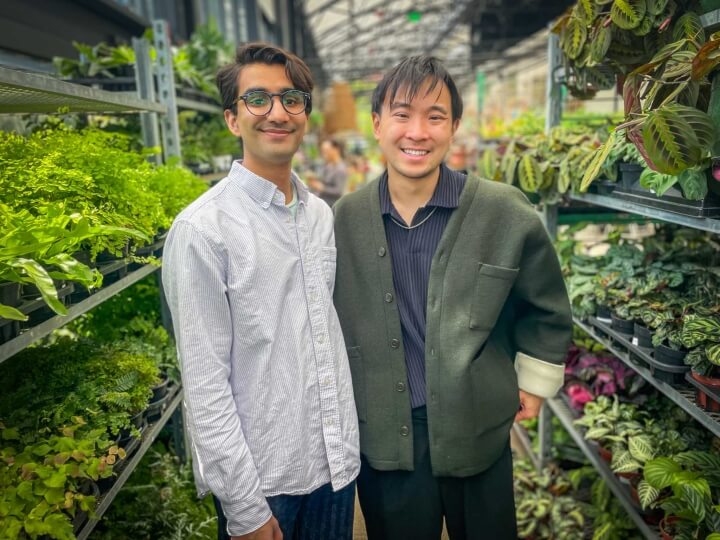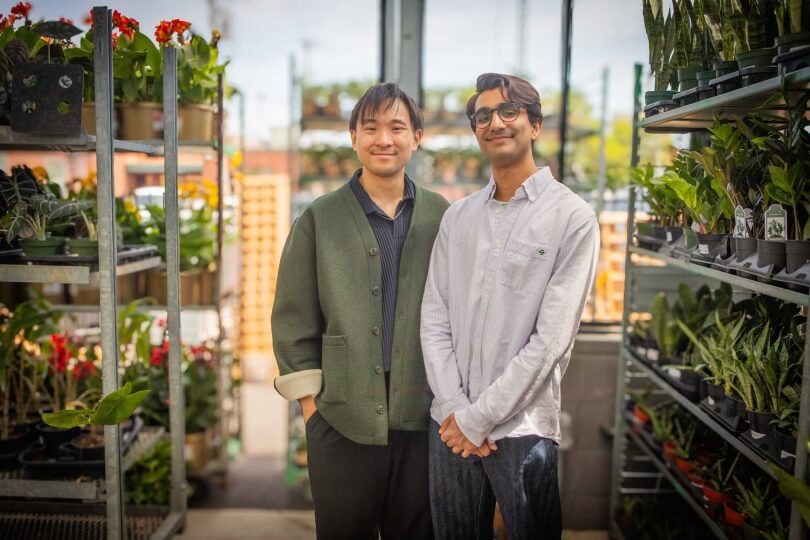Akhil Dayal and Darren Chin, second-year Master in Design Engineering students (Eliza Grinnell/SEAS)
Darren Chin and Akhil Dayal both grew up surrounded by farms – Chin in Edmonton, Alberta, Dayal in the greater Oakland area. As the two were gameplanning their capstone project for the Master in Design Engineering program, which is co-run by the Harvard John A. Paulson School of Engineering and Applied Sciences (SEAS) and Harvard Graduate School of Design, they decided to focus on a product that would suit the specific needs of small businesses and mom-and-pop shops. Returning to their roots, they decided local farms would be an ideal sector to try to make an impact.
“We both came from work environments that taught us about big companies, but the skills that small businesses need to thrive are different, and such an interesting system to really unravel,” Chin said. “When we thought about what kinds of small businesses are facing the most difficulties, we realized that small farms face the challenges of both small businesses and the agricultural sector. So we decided to really dig into that.”
Digging into the world of local farms ultimately led them to found Terra, an artificial intelligence-based platform that streamlines and eases many of the administrative tasks of farming, such as taxes and product sales. It also enables easy crop and market analysis, helping farms identify the best crops to focus on in any given season. Terra has already been tested with two farming collectives: Ho'ola Farms in Hawaii, and the Glynwood Center for Regional Food and Farming in the Hudson River Valley region of New York.
“It’s training wheels to get your business going,” Dayal said. “Everything is centered around what the farmer produces and informing seemingly easy questions like ‘what should I price this at?’”
Darren Chin and Akhil Dayal at Ho’ola Farms on the Island of Hawai’i
Ho’ola Farms on the Island of Hawai’i was the first test bed for Terra. Dayal was looking for a farming collective or co-op with an innovative model to distribute its produce to local customers and markets. Ho’ola’s mission of encouraging local food systems in Hawai’i and supporting aspiring new farmers, especially military veterans, connected with Dayal and Chin, and working with the farm taught the duo about the specific challenges of Hawaiian farming and food distribution, given that the large majority of food in the state is imported. The Glynwood Center for Regional Food and Farming in upstate New York, which promotes sustainable local food systems at multiple stages, from farming education to food distribution, provided another stress-test for Terra, as growing seasons and markets in New York make farmers’ needs far different to Hawaii.
“We started by thinking of designing an ‘Uber Eats’ network for local customers to connect easily with small farms and buy their products,” Chin said. “But we ended up realizing that for farms to even be able to participate in a network like that, they first need to understand their data as a successful business. A lot of existing business management tools either felt too generic, or too big. Creating something that was more scaled-back, bespoke to these ‘micro-businesses’ with no frills, really resonated with our users.”
Both Chin and Dayal joined the MDE after several years of working in industry. Chin, who’d studied operations management as an undergraduate at the University of Alberta, spent two years as a senior product strategist at Boston Consulting Group Digital Ventures before coming here, and is planning to return to that role with more perspective after getting his degree later this month.
“I’d become a designer by trade through my product work, and I thought this program would be a really great way to get the more formal fundamentals of design engineering,” Chin said. “I really wanted to be a builder and doer - building from scratch with my own hands.”
Dayal studied mathematics as an undergraduate at Williams College, but spent two years working at an architectural firm in Boston after getting his bachelor’s degree. A friend at the firm had already gone through the Harvard Graduate School of Design, and suggested Dayal would enjoy the curriculum.
“I really enjoyed the human-centered design aspect of architecture, listening to and designing things for people,” he said. “But I also missed the technical elements of my undergraduate math degree. The MDE seemed like a great opportunity to combine what I loved about design with what I loved about math. Over the past two years, I’ve really focused on problems at the intersection of design and technology, which has been really exciting.”
After graduating, Darren Chin and Akhil Dayal hope to continue developing their capstone project Terra, an artificial intelligence-based administrative platform for farmers (Eliza Grinnell/SEAS)
This isn’t the first project on which Chin and Dayal have collaborated. The two co-founded Zest Health, a platform centered around improving access and care for sexually transmitted illnesses. The project was part of the 2025 Harvard HealthLab Accelerator cohort. They also worked together on Crescendo, a MDE studio project in the first year which combines music therapy and physical therapy to help the elderly improve their cognitive and physical capabilities.
“What we’ve learned throughout all these projects is to understand the intervention point, the potential side effects, whether good or bad, and then the context of larger systems at play,” Chin said. “The difference between this and a more purely business-oriented environment is that measuring impact is implicit to the success of what we build. If it prevents more STIs or helps people with their physical therapy, we feel that success does translate to financial or entrepreneurial success. That’s a philosophy we learned through the MDE.”
While Chin plans to return to BCG after graduating, Dayal has recently taken a product role with an AI company. Despite returning to work right away, the hope is to keep Terra going in some capacity.
“At the minimum, we might open source the technology and hand it off with some best practices and start-up guides to the collectives we’ve been working with. Our capstone advisors Shuya Gong and Frank Nagle, who have seen this evolve throughout the year, have even suggested we build this as a venture,” Dayal said. “The process of building something with these farmers and getting to immerse fully has really highlighted how important small farms are to local food supplies and economies, and how it affects all of us. This has been quite an impactful experience for both of us as design engineers.”
Press Contact
Matt Goisman | mgoisman@g.harvard.edu

